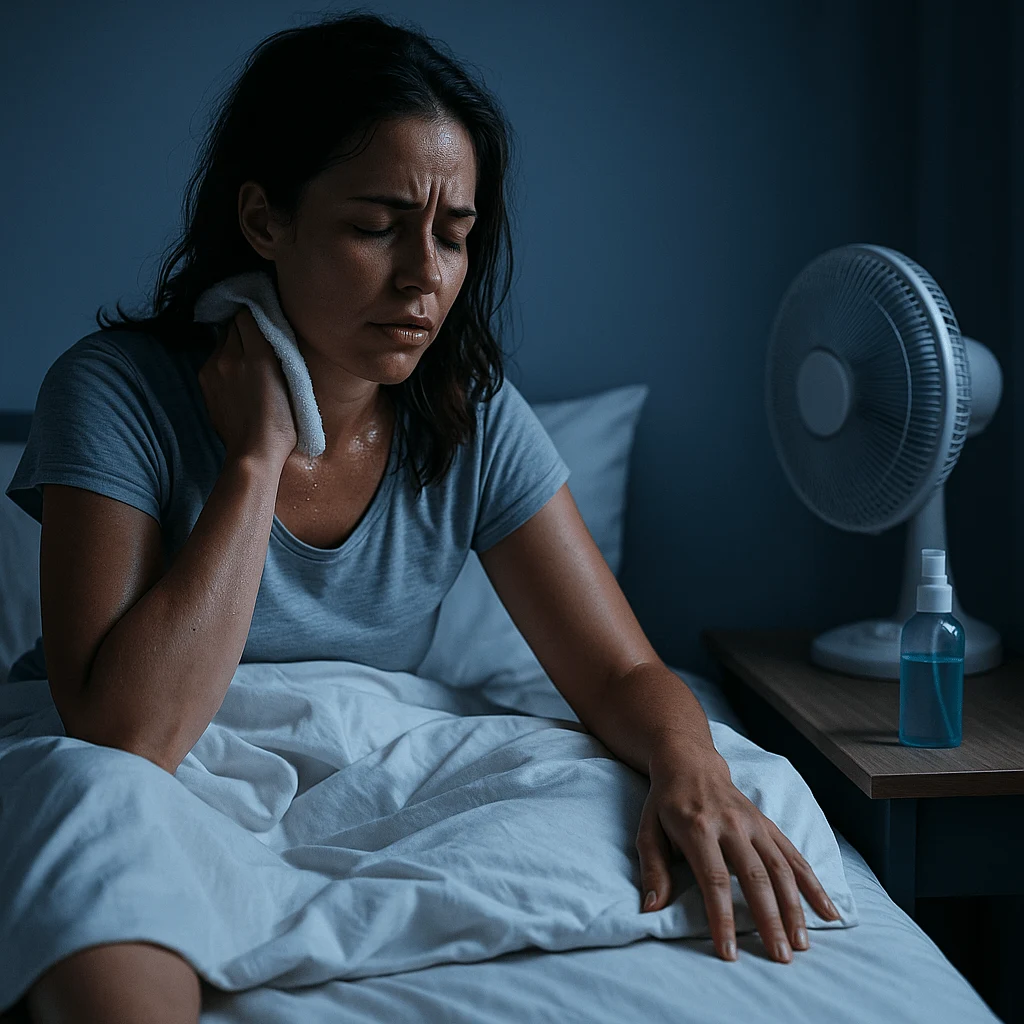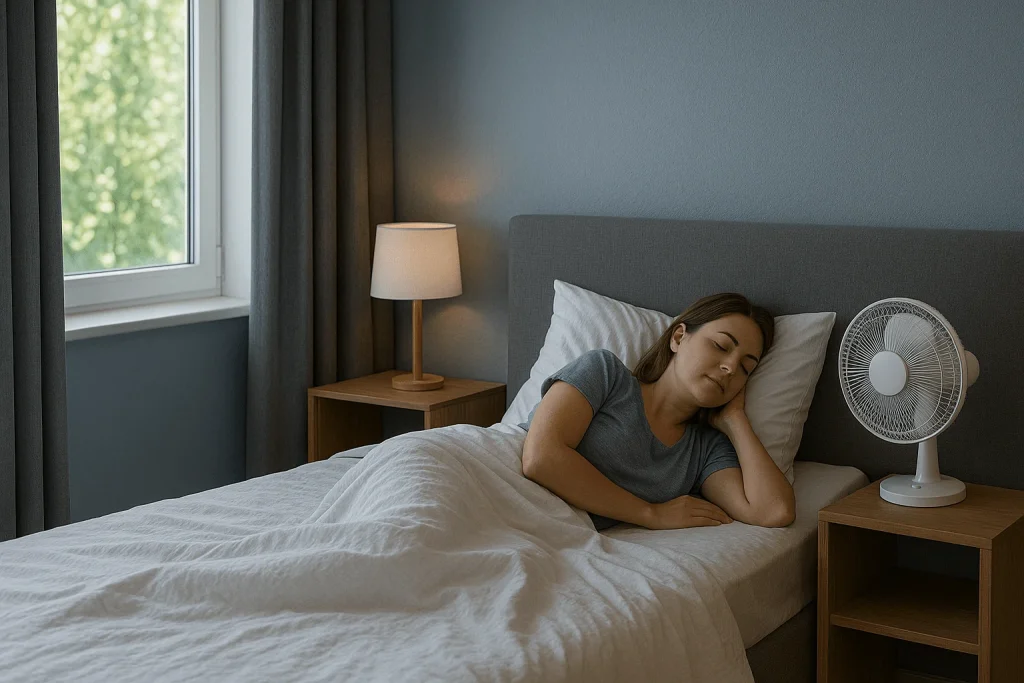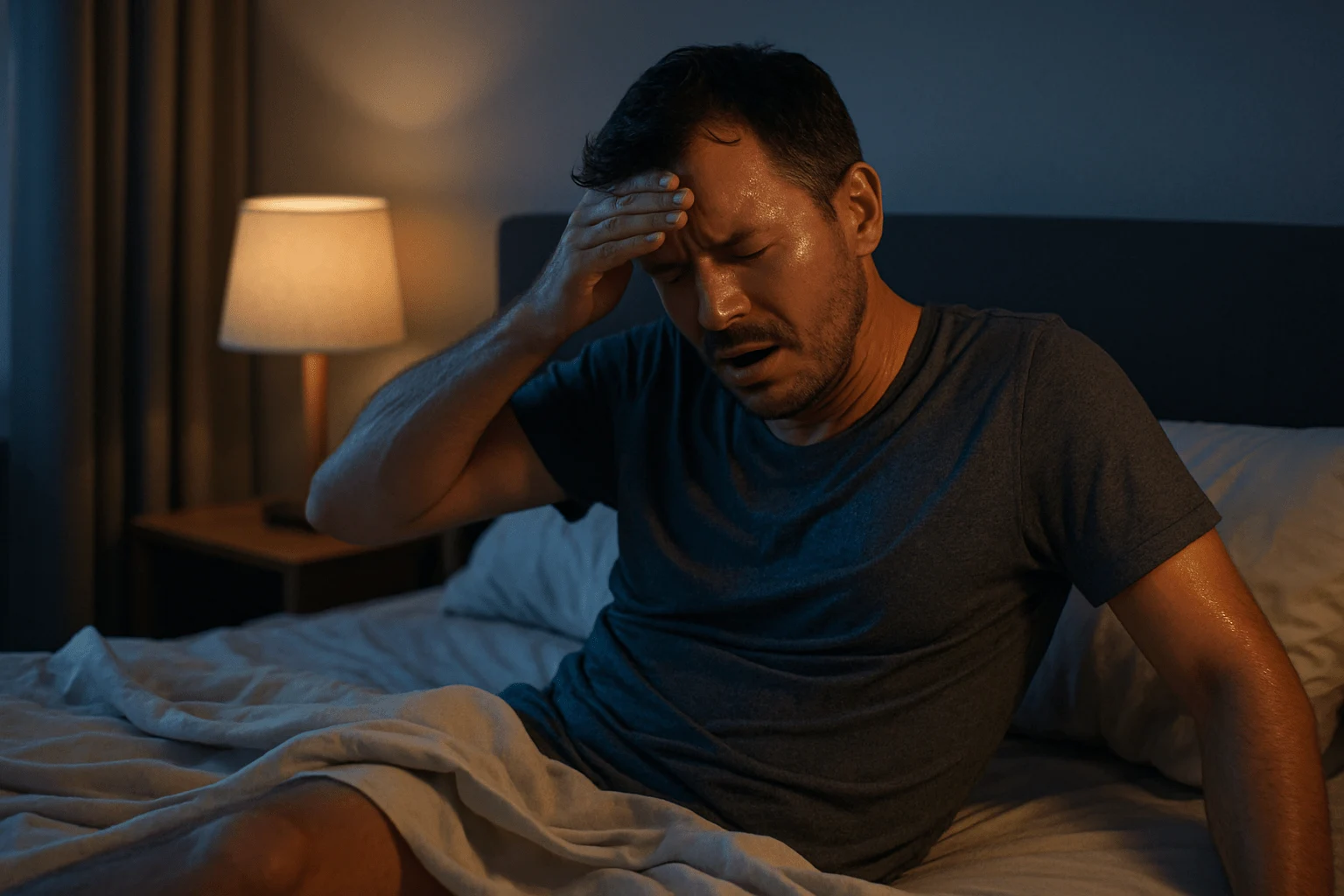You wake up at 3 a.m., sheets damp, shirt clinging to your back, and no idea why you’re sweating so much. The room isn’t hot. Your blankets aren’t heavy. And yet—this isn’t the first time it’s happened.
If you’ve ever asked yourself, “Why do I sweat in my sleep?”—you’re not alone. Night sweats are a common issue that can leave you feeling frustrated, uncomfortable, and wide awake in the middle of the night. And while sometimes it’s as simple as your bedroom being too warm, other times it can signal something deeper—like stress, hormones, or even an underlying health issue.
The good news? Most of the time, it’s manageable—and often fixable with a few small changes to your routine or environment.
In this article, we’ll walk through 10 common reasons you might be sweating at night, how to tell when it’s time to see a doctor, and what you can do to sleep cooler, more comfortably, and sweat-free.
Why Do I Sweat in My Sleep? (10 Common Causes Explained)

Not all night sweats are created equal. Sometimes it’s just your room being too warm or your blankets being too thick. Other times, it could be your body reacting to stress, hormones, or something more serious.
Here’s how to tell what might be behind your nighttime sweating—and what you can do about it.
1.Your Room or Bedding Is Too Warm
A bedroom that’s too hot—or bedding that traps heat—can cause your body temperature to rise during sleep, especially in the deeper stages when the body is supposed to cool down. This is one of the most common (and fixable) causes of nighttime sweating.
2.You Had Alcohol or Spicy Food Before Bed
Alcohol widens blood vessels and affects your nervous system, which can raise your core temperature. Spicy foods have a similar effect, triggering heat production (thermogenesis) even hours after you eat.
3. Stress or Anxiety Is Keeping Your Body Revved Up
Stress doesn’t shut off when you fall asleep. If your mind is anxious or overactive, your body may stay in a subtle “fight-or-flight” mode—leading to elevated heart rate, nervous energy, and increased sweating during the night.
4. Your Sleepwear or Mattress Is Trapping Heat
Synthetic fabrics, thick blankets, and foam mattresses can hold onto heat, even in a cool room. If your sleep environment isn’t breathable, your body may struggle to stay at a comfortable temperature while you rest.
5. Hormonal Changes (Like Menopause or Perimenopause)
Fluctuations in estrogen, especially during midlife, can confuse your internal thermostat. Many women in perimenopause or menopause experience sudden heat surges at night that lead to sweating, even in a cool room.
6. You’re Taking Medications That List Sweating as a Side Effect
Many medications can trigger sweating as a side effect—especially antidepressants, hormone therapies, diabetes medications, and even some blood pressure or pain relievers. Night sweats often appear after a dosage change or when starting a new prescription.
7. Your Blood Sugar Drops During the Night
When blood sugar drops too low (especially in people with diabetes), the body releases adrenaline to compensate. That surge can lead to sweating, restlessness, and even vivid dreams or nighttime awakenings.
8. Your Thyroid Is Overactive
An overactive thyroid (hyperthyroidism) speeds up your metabolism, which can lead to sweating—day and night. It often comes with other symptoms too, like weight loss, heat intolerance, or a racing heart.
9. You Have a Sleep Disorder (Like Sleep Apnea)
Sleep apnea causes brief interruptions in breathing throughout the night, which can trigger spikes in stress hormones. These surges often lead to sudden sweating—even if you don’t fully wake up or remember the episodes.
10. An Underlying Health Issue Might Be the Cause
In some cases, night sweats are linked to more serious conditions, such as infections, thyroid disease, autoimmune disorders, or cancers like lymphoma. These are usually accompanied by other symptoms like fever, fatigue, or weight loss.
When Should I Be Worried About Night Sweats?

Occasional sweating at night isn’t unusual—especially if you’re bundled up or the room runs hot. But if it’s happening regularly, or soaking through your clothes and sheets, it’s worth paying closer attention.
Night sweats can sometimes be your body’s way of signaling that something deeper is going on.
⚠️ Here are signs you shouldn’t ignore:
- You’re waking up drenched, even when the room is cool
- You’re also experiencing unexplained weight loss
- You have a persistent fever, cough, or fatigue
- You feel pain, weakness, or swelling in certain areas
- The sweating is new, sudden, or getting worse over time
If any of these apply to you, it’s time to speak with your doctor.
They’ll likely start with a simple conversation and some basic tests—like bloodwork or a chest X-ray—to look for signs of infection, hormone imbalance, or something more serious. In some cases, a sleep study may be recommended to check for apnea or other nighttime disruptions.
The important thing to know? You don’t have to wait until it’s unbearable. If your night sweats are affecting your sleep, mood, or energy during the day, your doctor can help you get to the root of it—and find relief.
How to Stop Night Sweats Naturally

You don’t always need a prescription to cool things down at night. In fact, some of the most effective solutions are simple adjustments to your routine and environment.
Here are a few natural strategies that can help reduce night sweats—and improve your sleep quality overall:
1.Cool down your sleep space
Your bedroom temperature matters—a lot. A warm room traps heat and can send your body into sweat mode, especially during deeper sleep stages.
Try this:
- Set your thermostat to 65–68°F (18–20°C)
- Use a fan or open a window for extra airflow
- Avoid flannel sheets, down comforters, or heavy duvets
2.Rethink your sleepwear and bedding
Synthetic fabrics hold onto heat and moisture. Natural fibers like cotton and bamboo are more breathable and wick moisture away from your skin.
Upgrade your setup:
- Lightweight cotton pajamas or sleep shirts
- Breathable sheets and pillowcases
- Consider a cooling mattress topper or switching from foam
3.Avoid triggers in your evening routine
Certain foods and drinks can raise your internal temperature—sometimes without you realizing it.
Cut back before bed on:
- Alcohol
- Caffeine
- Spicy foods
- Large, heavy meals
Give your body a few hours to settle before lying down.
Related Posts:
4.Manage stress before bed
Your nervous system plays a big role in regulating body temperature. If you’re anxious or wired before sleep, your body may stay in fight-or-flight mode, even as you drift off.
Build a calming routine:
- Deep breathing or guided meditation
- Gentle stretching or progressive muscle relaxation
- No screens 30–60 minutes before bed
Small rituals can go a long way in telling your brain it’s safe to cool down and rest.
Related: How to Use Meditation for Sleep: A Step-by-Step Guide
5.Stay consistent with your sleep habits
Irregular sleep times, erratic eating patterns, or frequent late nights can throw off your body’s internal rhythms.
Support your natural sleep cycle by:
- Going to bed and waking up around the same time every day
- Limiting naps, especially late in the afternoon
- Getting exposure to natural light during the day
Your body likes routine—and that includes how it regulates temperature at night.
These natural fixes won’t solve every case of night sweats, but for many people, they make a noticeable difference—often within just a few nights.
When Medical Treatment Might Be Needed

If you’ve tried adjusting your environment and habits but you’re still waking up drenched in sweat, it’s worth checking in with your doctor.
In some cases, night sweats can be linked to:
- Hormonal changes (like menopause)
- Side effects from medications
- Sleep apnea or other sleep disorders
- Infections, thyroid issues, or more serious conditions
A quick evaluation—like bloodwork or a sleep study—can help pinpoint the cause and guide treatment. The sooner you get answers, the sooner you can sleep comfortably again.
Related Post: The Most Overlooked Sleep Disorders ( and how to spot them early)
Final Thoughts:
If you’ve been asking yourself, “Why do I sweat in my sleep?”—know that there’s usually a clear reason, and in most cases, it’s something you can manage or treat.
Whether it’s your sleep environment, something you ate, or changes in your body, night sweats are often your system’s way of asking for balance. With a few small adjustments—or the right medical support—you can start waking up dry, rested, and more comfortable.
Still have questions? Let’s cover some of the most common ones next.
FAQs About Sweating in Your Sleep
Why do I get sweaty in sleep?
Sweating in your sleep can be caused by a warm room, heavy bedding, stress, spicy food, or hormonal changes. It may also be linked to sleep apnea, low blood sugar, or medications.
What are night sweats a symptom of?
Night sweats can be a symptom of hormonal shifts, thyroid issues, infections, certain cancers like lymphoma, or sleep disorders. If they happen often or with other symptoms, it’s important to see a doctor.
Why are night sweats considered a red flag?
Night sweats may be a red flag when they’re persistent, drenching, and paired with weight loss, fever, or fatigue. These signs can indicate an underlying medical condition that needs attention.
Do night sweats ever signal heart problems?
Night sweats aren’t a common sign of heart problems, but they can occur with conditions that increase stress on the body. If you also have chest pain or shortness of breath, get checked.
What foods can trigger night sweats?
Spicy foods, alcohol, and caffeine can trigger night sweats by raising your core body temperature or stimulating your nervous system. Avoid these in the hours before bed.
Is it normal to sweat in your sleep?
Mild sweating during sleep can be normal, especially in a warm environment. But frequent, heavy night sweats—especially with other symptoms—may signal something more serious.


